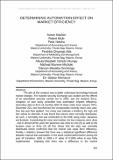| dc.description.abstract | The aim of this research was to better understand technology-induced market changes. The Nairobi Security Exchange was studied and the effects of an automation exercise carried out in 2006, was the research focus. Adoption of case study unraveled how automation impacts efficiency. Secondary data in form of monthly NSE-20 share index from January 2001-December 2011 and transformed into compounded monthly return was used. Run test was then applied. Too many runs indicate a tendency for high and low values to alternate; it was found that returns were normally distributed. As such, a normality test was conducted on the NSE using mean, skewness and kurtosis. Considering the mean and median, the two measures were close, and in almost all the years the skewness was close to zero (0) as well as the kurtosis close to three (3) all this shows that the data was normally … | en_US |

